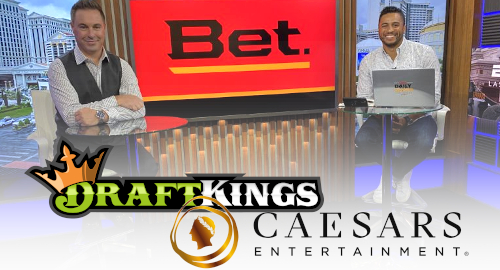 Sports broadcaster ESPN continues to deepen its ties to sports betting while the US gaming lobby tries to impose a little restraint on its operators’ marketing efforts.
Sports broadcaster ESPN continues to deepen its ties to sports betting while the US gaming lobby tries to impose a little restraint on its operators’ marketing efforts.
On Sunday, the first weekend of the NFL’s 2020 season, ESPN announced the debut of Bet, a new half-hour betting-focused program hosted by Joe Fortenbaugh and Tyler Fulghum. The show, which is produced out of ESPN’s new studio at Caesars Entertainment’s Linq casino in Las Vegas, will stream three nights on ESPN’s digital platforms.
Those platforms now include the ESPN Sports Betting YouTube channel, which is also making its debut on Monday. In addition to the new Bet program, the channel will feature segments from ESPN’s Daily Wager, SportsCenter and other shows.
ESPN also announced a pair of ‘exclusive’ deals with gambling operators Caesars and DraftKings. The multi-year Caesars deal calls for ‘link integrations’ to apps from Caesars’ sports betting provider William Hill US through ESPN.com, mobile web and the ESPN Fantasy app. ‘Caesars Sportsbook by William Hill’ will also sponsor ESPN’s Fantasy products, “deepening an integration as ESPN’s exclusive odds provider.”
The DraftKings deal – which that company at least had the honesty to call ‘co-exclusive’ – offers DraftKings the same linking privileges but also entitles the company to call itself ESPN’s ‘exclusive daily fantasy sports provider.’ DraftKings will provide existing and future ESPN programming with “dedicated segments for promotion, beginning with daily fantasy sports.”
The US stock market reacted to Monday’s deal announcements with its typical restraint, pushing DraftKings’ share price up a totally reasonable 17.3%, while Caesars gained a relatively paltry 9%.
US GAMING LOBBY TRIES TO REIN IN BETTING MARKETING
Sportsbooks like DraftKings have been frantically signing marketing tie-ups to ensure high visibility during the all-important NFL season. This is providing unprecedented marketing opportunities, but fears are mounting that the US is failing to learn from bookmakers in European markets, who saw their advertising wings clipped after failing to read the signs the regulators were sending.
As luck would have it, Monday saw the American Gaming Association (AGA) kick off Responsible Gaming Education Week by activating the enforcement process of its new Responsible Marketing Code for Sports Wagering.
The AGA’s idea is that members of the public who find themselves outraged over some outrageous form of betting marketing can file a complaint with the AGA’s new Code Compliance Review Board, which is comprised of individuals from US gaming operators and members of the gaming studies division at the University of Nevada, Las Vegas.
The code’s content is nothing revolutionary, primarily focused on ensuring responsible gambling messaging in all betting promos and ensuring that promotional material doesn’t unnecessarily expose itself to anyone too young to legally wager (including college ‘kids’). There are also the standard caveats regarding promoting ‘irresponsible or excessive’ wagering or implying that betting will result in ‘social, financial or personal success.’
The biggest question regarding the AGA’s code is how long will it be before the eternal frat boys over at Barstool Sports bring the industry into disrepute. If nothing else, that should prove interesting for Barstool’s betting partner Penn National Gaming, whose chief compliance officer Chris Soriano is on the review board.